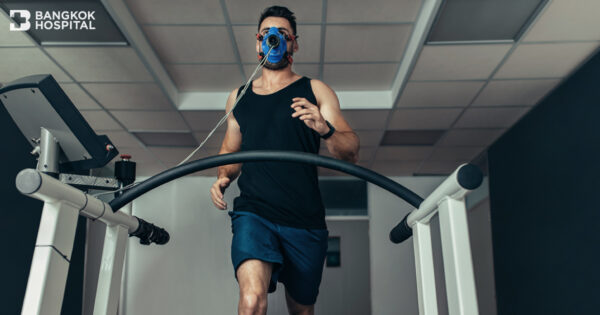Currently, running has become very popular because consistent running leads to runners having good health and a strong body. However, for beginners who have just decided to start running, or even those who already run regularly but want to improve their running potential, they may want to run longer distances or want to reduce their running time to set a new record. Multiple factors must be considered because increasing the intensity of exercise for the body may result in unexpected adverse effects.
Health Check Before Running
If a runner has hidden conditions or diseases, especially heart diseases, when exerting more than usual, it means there’s a risk of death without any warning signs, or what is medically termed as Sudden Cardiac Death, which is the most common cause of sudden death among athletes. This condition is hard to detect through regular health screenings or general physical examinations. Therefore, the primary goal of pre-exercise health check-ups and running is to screen for heart disease risks.
In 2015, the American College of Sports Medicine recommended the following health screening before exercising:
-
Consistency of physical activity
-
Any symptoms related to heart disease, such as dizziness, blackouts, chest tightness, palpitations, or having metabolic and kidney diseases or not
-
The level of exercise intensity desired
These data will be used to assess the risk, for example, if you do not exercise regularly or have symptoms indicating a risk of heart disease and other mentioned diseases, as well as if you want to increase the intensity of exercise, it is necessary to undergo a physical examination, blood tests, and an Exercise Test based on the indicated history (focusing mainly on heart disease).
Goals of Health Check Before Running
The goals of health check before running are as follows:
-
Screen for conditions that are contraindications to exercising by running
-
Screen for medical conditions or diseases (that can be treated) that may interfere with exercising by running
-
Identify risks of injury or past injury history, including incorrect training methods
-
Assess fitness level, which affects the proper training program design
-
To be used as baseline data for future reference
Health Screening Process
The health screening process starts with a medical history and answering short questions about health and physical activity (PAR – Q) about 6 – 7 items. Then, individuals at risk will have to undergo a physical examination, X-Ray, blood tests, and Exercise Stress Test based on the indications to examine heart conditions as mentioned above. If there is no risk, a fitness level test (Fitness Testing) will be conducted, which will show the physical performance in different aspects of the runner, including- Inbody measures body composition, muscle, and fat
- Sit and Reach Test measures body flexibility
- Balance Test measures balance
- Hand Grip Test measures grip strength
- Jump Test measures leg strength
- Aerobic test (VO2 Max Test) aims to measure the maximum rate of oxygen consumption of the body during exercise, known as VO2 max. If someone has a high value, it indicates high fitness. The test has two methods:
-
YMCA Bicycling Submaximal Test requires the test participant to cycle, increase the intensity, and use the heart rate to calculate VO2 max.
-
Oxycon Direct Gas Analysis Test measures the exchange rate of oxygen and carbon dioxide, which can measure VO2 Max directly and more accurately.
For those whose hearts love running, whether you are a beginner or a professional looking to improve your running, both in terms of distance and time, besides having a strong body from regular running, undergoing a physical examination and readiness before running is also important. Don’t forget to get a health check-up for runners.











